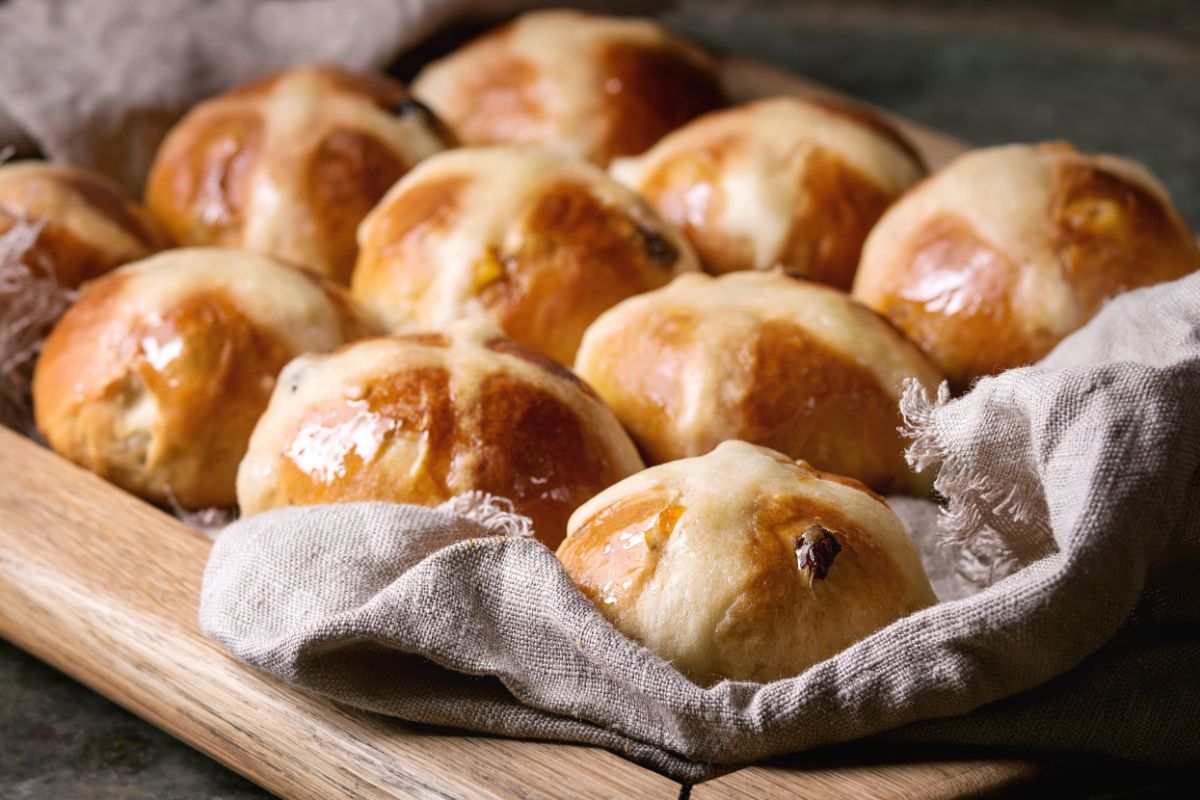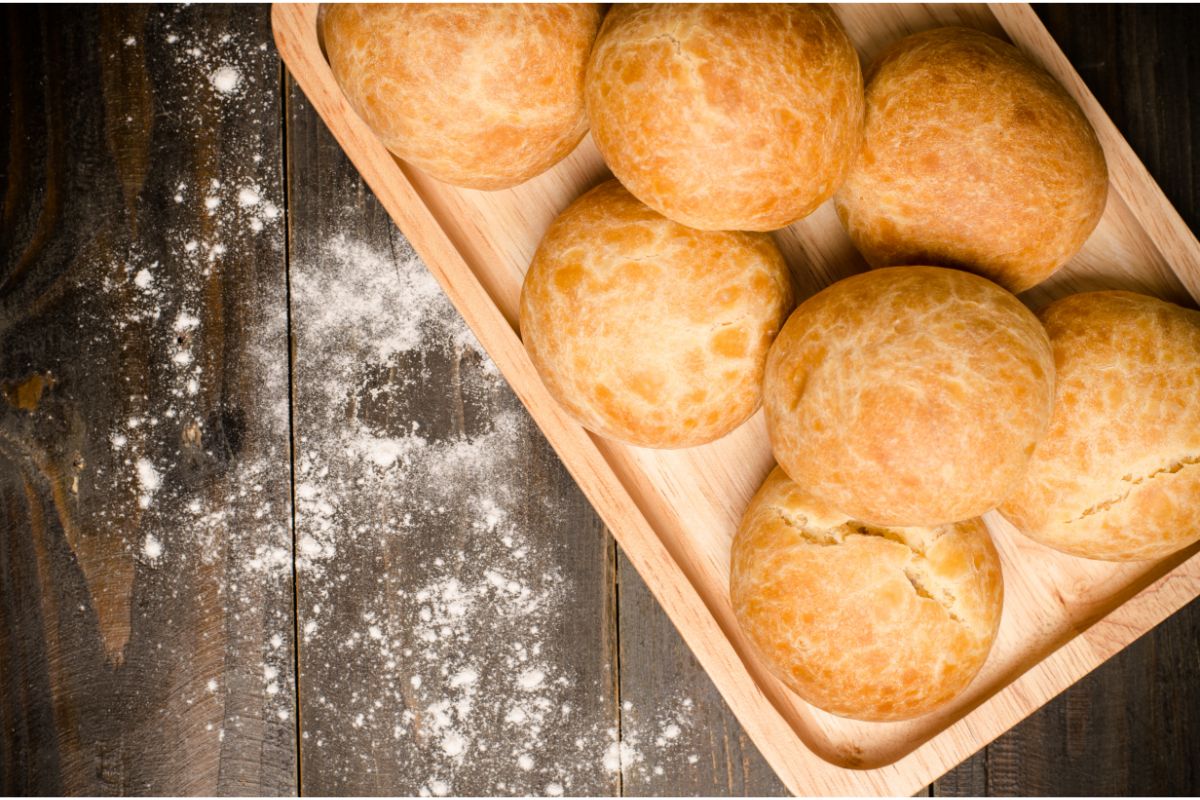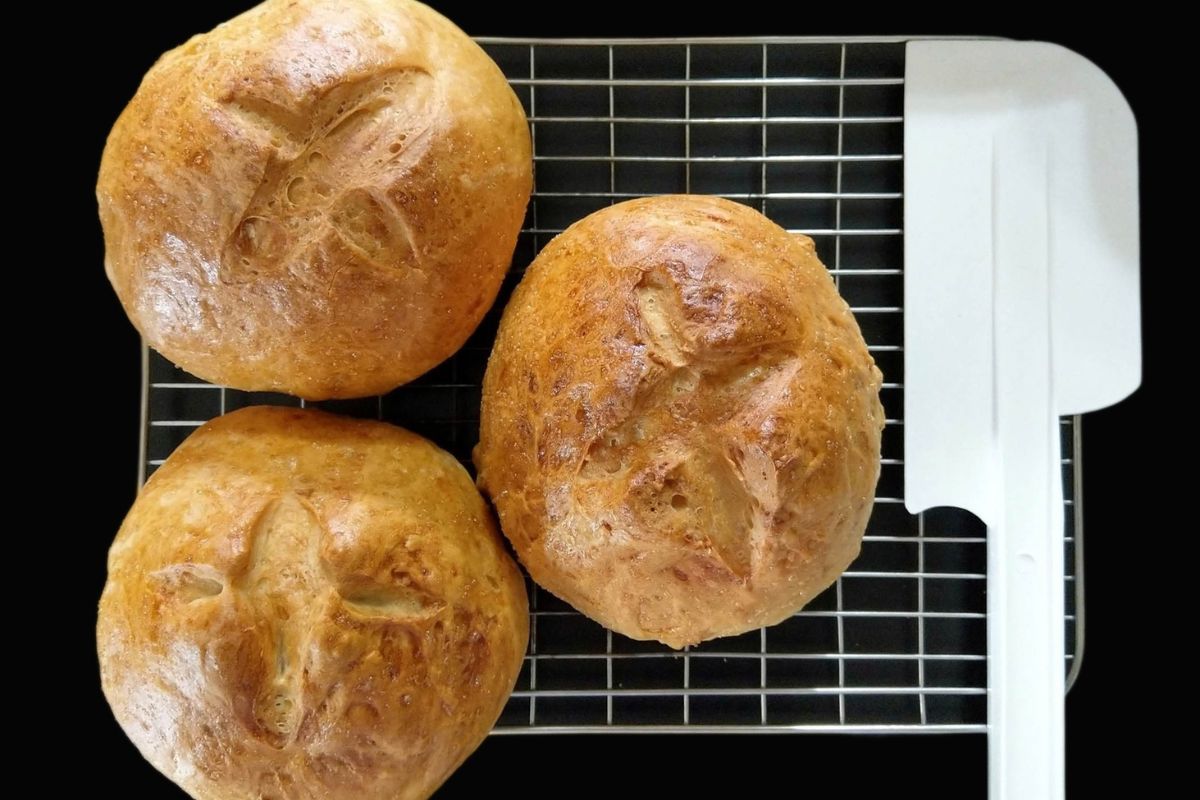What’s not to love about a potato bun: it is super soft, fluffy and moist. You can enjoy these delicious buns fresh from the oven or with your favorite jam.
But the best thing about a good soft potato bun recipe is that you can make it with just a few ingredients at home.

You just make mashed potatoes and turn them into fluffy rolls. For an extra sweet twist, you can also glaze the buns with some honey and butter.
We take you through each step of how to make our famous, soft potato buns, including variations for gluten-free and vegan options.
Why We Love A Good Potato Bun
There is nothing better than a warm, homemade soft potato bun melting in your mouth. Our tasty potato bun recipe is super quick and easy to whisk together. You don’t even need to knead dough.
Mashed potatoes are much easier to work with than a dough mixture, so there is very little that can go wrong with this recipe.
These fluffy potato buns are moist on the inside with a sweet buttery aroma as a glaze. The high moisture content means your buns stay soft and fresh for longer.
Another reason why our potato buns are so popular is that you can easily swap out individual ingredients to adapt the buns to a gluten-free or vegan diet.
Ingredients For Soft Potato Buns
Soft potato buns are surprisingly easy to make and you don’t even need a lot of ingredients. Here are all the things you need for tasty potato buns.
- Whole wheat flour: 3/4 cup or 90g (you can also use gluten-free all purpose flour to make gluten-free potato buns)
- All purpose flour: 2.5 cups or 325g (use gluten-free all purpose flour for potato buns free from gluten)
- Mashed potatoes: 1 and 1/3 cup or 310g
- Yeast: 1tsp
- Salt: 1.5 tsp
- Sugar: 2 tbsp or 25 g
- Egg: 1
- Butter: 3 Tbsp or 42.6 g
- Water: 120 g or half a cup (you can also use potato starch water)
How To Make Soft Potato Bun
It only takes five easy steps to whisk your soft potato buns together. Just get all your ingredients ready and lay them out on a table.
Step 1: Prepare Your Potato Bun Dough
While you won’t create a traditional baking dough, you need to mix all your dry ingredients together in a bowl. Keep in mind that the dough will rise, so use a bowl that’s large enough to hold double the amount of your ingredients.
Simply add the salt, sugar, yeast and flower to your bowl and blend them well. Make sure that you mix the flour properly. Next, add the mashed potatoes, egg and water into your mixing bowl and gently blend the entire mixture.
It doesn’t require kneading but you want to end up with something that looks like bread dough. If you struggle to get the mix into a homogenous dough, then you can also use a stand mixer.
If you choose to mix with a mixer, then you can add all the ingredients into the mixing bowl and whisk the blend for half a minute on a low setting.
Check what the potato bun dough looks like and then whisk it again for another couple of minutes on a high setting.
You want to make sure that none of the flour sticks to the bottom or the side of the bowl. Scrape around the inner edges of the bowl to loosen any remaining flour.
Step 2: Allow Your Dough To Rest
Once you have a smooth mix, take some plastic film and stretch it over the bowl. Then, place your bowl in a warm room and allow it to rest for 90 minutes.
Your soft potato bun dough will rise to almost double the size during this time.
Step 3: Divide The Dough And Shape Your Buns
Once your dough has risen, take some all-purpose flour and sprinkle it onto a clean, flat surface. Make sure to keep some extra flour nearby, so the dough doesn’t stick to your hands when you shape it.
Next, remove the dough from the bowl and place it onto the floured surface. Now, divide the dough into squares.
You can make the squares any size but it is easier to work with smaller dough portions. Just ensure that all your small squares are equal in size.
Then, shape each dough square into small balls. This is one of the most common shapes of soft potato buns. However, you can make any shape you like, including croissants or pretzel shapes.
The shape of your bun doesn’t impact the taste and they can be a great decorative project for kids to make for Easter or Christmas.
After you finished your potato buns, grease a baking tray with butter and place the buns on the tray. You can also use parchment paper to ensure your baked goods don’t stick to the tray.
Step 4: Let The Potato Bun Dough Rest Again
Before you put your potato buns into the oven, just let them rest for another half an hour. This allows the dough to rise a second time making your treats extra fluffy.
After 30 minutes, whisk a tablespoon of milk and one egg together, and give your buns a good egg wash. This will make your potato buns look shiny with a beautifully golden crust.

Step 5: Bake Your Potato Buns
Once you glazed your potato bun shapes, place the tray into the oven at 350 degrees Fahrenheit.
It takes between 20 and 25 minutes for your buns to turn golden brown. This being said, the baking time can vary depending on the size of your potato bun rolls.
Just keep in mind that smaller buns bake much faster than larger ones, so check your baked goodies regularly to make sure they don’t burn.
Once they are done, take them out of the oven and let them cool. If you love your potato buns sweet, then you can enjoy your treats with some honey or sweet jam.
You can also enjoy your soft potato buns warm but let them cool down for a few minutes as they may still be too hot to eat.
How To Substitute Egg In Our Soft Potato Bun Recipe
Eggs are a popular baking ingredient but they are not vegan-friendly. Typically, eggs help the dough to rise which makes buns soft and fluffy.
You can replace the one egg in our recipe for soft potato buns with 3 tablespoons of milk or water. This won’t change the taste or texture of your potato bread.
If you want to make vegan potato buns, then simply replace the egg with three tablespoons of water or vegan milk. You can use any type of dairy alternative, including coconut milk, soy milk or oat milk.
How Long Do Potato Buns Last?
Soft potato buns that are stored properly can last up to four days. The potato starch makes keeps the bun moist inside, giving it a longer shelf life.
This being said, it is important that you thoroughly cool your potato bun rolls before you put them into a storage container. Alternatively, you can also use a plastic storage bag to keep your buns from drying out.
Make sure to keep your moist potato buns away from direct sunlight and store them at room temperature.
Why Do Potato Buns Stay Soft For So Long?
The potatoes in soft potato buns are packed with plenty of starches that ensure the bun stays soft for longer. The starches of regular buns without potatoes crystallize as they cool. This traps water inside the crystals, drying your buns out.
In comparison, a bun that contains a form of potatoes has potato starch that slows down this process which means your potato bread can stay softer for longer.

Are Potato Buns Lighter Than Other Buns?
Yes, potato buns are typically slightly lighter than regular buns because they are made with yeast. Yeast rises faster making the bun soft and fluffy.
At the same time, the potato starch in a potato bun traps the moisture which allows your baked goods to stay soft for much longer than a normal bun.
Nutritional Value Of Potato Buns
Our potato buns have a better nutritional value than store-bought buns. Here are the nutritional details for soft potato buns.
- Total calories of one potato bun: 145 calories
- Carbohydrates in one potato bun: 24g
- Proteins: 4g
- Fat: 3.7g
Health Benefits Of Potato Bread
Potato buns, also known as potato bread, have a variety of health benefits. Here are a few good reasons why you can enjoy a moderate amount of potato buns without regret.
Potatoes in potato buns are cholesterol free and low in fat. They also contain very little salt which is good news for your heart and cardiovascular system.
Plus, potato buns also have plenty of vitamin C which is typically more than the vitamin C content in a single tomato. Compared to wheat bread, potato bread contains a large amount of vitamin E. This antioxidant boosts your immune system.
Potatoes contain a lot of potassium which helps to lower blood pressure and keep your heart healthy. While potato bread isn’t low in calories, it contains a lot less than wheat bread and other types of bread.
While potato buns are an excellent source of folate, they have a greater variety of folates than other whole-wheat bread.
Folate is essential for digestion and mineral absorption, so you need to ensure that you consume a variety of foods that are rich in various folates.
In comparison to wheat bread, potato bread and potato buns can also be gluten-free and vegan. You just replace the wheat flour with gluten-free flour and the egg with water.
Can You Freeze Soft Potato Buns?
Yes, you can easily freeze potato buns and potato bread. Just allow the buns to fully cool. Then wrap them individually in aluminum foil and place them into a freezer bag.
This ensures that the buns won’t dry out or get damaged by freezer burn. You can keep your potato buns in the freezer for up to one month.
Once you are ready to eat your buns, allow them to thaw at room temperature and then warm them up again at a low temperature in the oven.
Frequently Asked Questions
A regular bun is made with some type of potato. This could be potato starch, potato flour or mashed potatoes.
In comparison, regular bun dough is made without potato or potato starch. Both types of bun taste similar, although a potato bun stays soft for longer.
Yes, both potato buns and potato bread contain a lot of nutrients that your body needs to function, including iron and zinc.
Potatoes and the wheat flour in potato rolls have a lot of potassium that strengthens our bones.
No, a potato bun has a similar amount of gluten to a regular bun because they both use wheat flour.
If you want to make your own gluten-free bun, then just replace the wheat flour with gluten-free all purpose flour.
No, brioche and potato bun are two different buns. A brioche is much lighter and fluffier than a potato bun.
This being said, they have a similar subtle taste and texture which makes brioche and potato buns incredibly versatile for sweet and savory recipes.
Final Thoughts
Making a soft potato bun recipe is quick and easy. Plus, you can even get creative with some individual bun shapes for the festive season or special occasions.
Potato buns have a subtle flavor which means you can add any glaze or jam you like. You can even make a savory potato bun by spreading it on cream cheese or butter.
- How To Reheat A Cheesesteak - November 5, 2023
- What Are Three Must Have Kitchen Knives? - September 22, 2023
- How To Protect Edges Of Pie Crust - June 15, 2023








